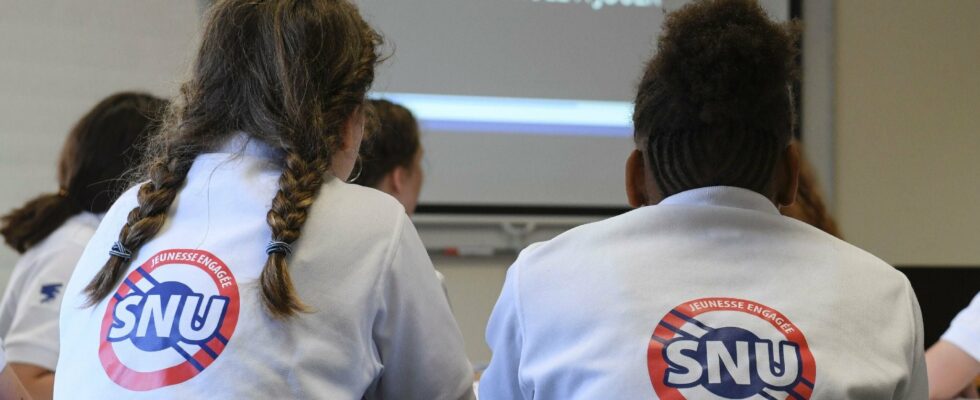The universal national service, which has struggled to convince since its launch in 2019, could well be given a new lease of life. Anne Genetet, the new Minister of National Education, and Gil Avérous, her counterpart for Sports, Youth and Community Life, have at least one thing in common: these two new members of the government are fervent defenders of this system dedicated to young people aged 15 to 17 who volunteer to take part in a two-week “cohesion stay”, then in a “mission of general interest” in an association, a public service or even a socially useful solidarity enterprise. Although the new host of the rue de Grenelle refrained from addressing this explosive subject during the handover ceremony with her predecessor Nicole Belloubet on 23 September, her past statements indicate an interest in the SNU.
In May 2024, the former MP (Ensemble pour la République), then a member of the National Defense and Armed Forces Committee, praised this “social project designed to foster a sense of national unity through the shared values of citizenship, commitment, and cohesion.” “Anne Genetet knows this subject very well, on which we have been led to work together,” confirms MP (Les Démocrates) Christophe Blanchet. “It remains to be seen what her line of action will be because, since 2019, the initial mission of the SNU has changed significantly,” continues the elected official. Above all, will the new minister venture onto this highly slippery terrain? The system is criticized by the majority of players in the educational world, including teachers’ unions. A “costly farce” denounces the Snes-FSU, while the CGT Educ’action sees it as “putting young people into line,” and the Snalc denounces a “whim” of the President of the Republic.
It was Emmanuel Macron himself who mentioned this project for the first time during a speech on defense given on March 18, 2017. “The strategic situation […]the threats weighing on our country also require us to strengthen the link between the armed forces and the nation, by allowing all of our young people to experience military life and to be full-fledged players in the spirit of defence”, declared the man who was then a candidate in the presidential election. The SNU was originally intended to be aimed at “capable young women and men of a whole age group – around 600,000 young people per year”.
But since its launch in 2019, only 90,000 volunteers have answered the call. “Today, we need to create the conditions for membership. This can only truly be done if the offer is the same throughout the territory. Which is not the case for the moment,” acknowledges Christophe Blanchet, who, last May, proposed several avenues for improvement in an information report on the role of education and culture in national defense.
“A generalization is impossible”
The lack of supervisors, premises and a series of slip-ups have tarnished the reputation of the SNU in recent years. On 13 September, it was the final blow: the Court of Auditors denounced “unsatisfactory institutional and budgetary management”, “a forced increase in workload despite significant deployment difficulties”. The wise men of Rue Cambon are especially concerned about the financial burden that the system represents. It is “probable that the annual operating costs of the SNU are between 3.5 and 5 billion euros, not including future investment costs”. “We now know that generalisation is impossible. In this period of budgetary difficulties, we must know how to be reasonable”, says Laurent Lafon, senator (Union centriste) and president of the culture, education, communication and sport committee.
A response to former Prime Minister Gabriel Attal who, on January 30, 2024, announced a generalization of the system for 2026. “Let’s not forget that it’s also a bit of his baby. He was the one who really carried the project when he was Secretary of State to the Minister of Education and Youth [NDLR : entre 2018 et 2020]”, recalls Fatiha Keloua-Hachi, deputy (PS), president of the culture and education commission of the National Assembly. As Gabriel Attal also intends to influence the decisions taken in the education sector, there is no doubt that his opinion will carry weight.
There remains this unknown: Will the SNU file remain in the fold of the Ministry of Education or will it be transferred to the Ministry of Youth, Sports and Community Life? In February 2022, Gil Avérous, the new minister, co-signed a platform with a hundred other mayors calling for their “wishes for the generalization of the universal national service”. We will have to wait for the upcoming publication of the allocation decrees to know who, he or Anne Genetet, will inherit this “hot potato” that the SNU has become.
.
